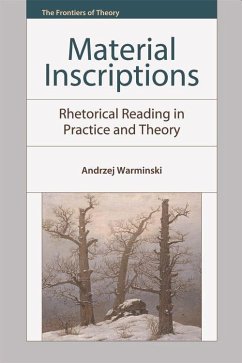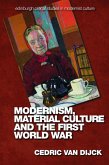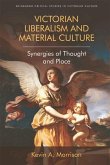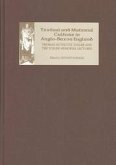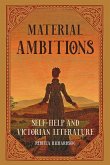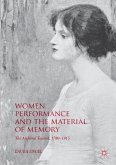'An extraordinary book of rigor and troubling originality. Part of what is so disturbing about Material Inscriptions is that it reads both literary texts (Wordsworth et al) and philosophical or theoretical texts (Hegel, Descartes, Nietzsche, de Man) in more or less the same way, that is, with special attention to details of figurative language.' J. Hillis Miller, University of California, Irvine 'A remarkable demonstration by one of Paul de Man's most brilliant students of how rhetorically alert readings reveal a "material" dimension of texts that is otherwise imperceptible. Warminski's work powerfully demonstrates the continuing fecundity of theoretically informed criticism when it respects the singularity of texts.' A new work of scholarship in the practice of rhetorical reading This monograph provides readings of literary and philosophical texts that work through the rhetoric of tropes to the material inscription at the origin of these texts. The book focuses on the practice and pedagogical value of rhetorical reading. Its readings follow an itinerary from poetic texts (such as those by Wordsworth and Keats) through theoretical or philosophical texts (by Descartes and Nietzsche) to narrative fiction (by Henry James). The book also contains two essays on Paul de Man and literary theory and an interview on the topic of "Deconstruction at Yale." All three of these latter texts are explicitly about the inescapable function and importance of the rhetoric of tropes for any critical reading or literary study worthy of the name. As Andrzej Warminski demonstrates, 'rhetorical reading' is a species of 'deconstructive reading' - in the full 'de Manian' sense - but one that, rather than harkening back to a past over and done with, would open the texts to a different future. Andrzej Warminski is Professor of English at the University of California, Irvine. He has published Ideology, Rhetoric, Aesthetics: For de Man with Edinburgh University Press (2013). He is also the author of Readings in Interpretation: Hölderlin, Hegel, Heidegger and the editor of Paul de Man's Aesthetic Ideology. Cover image: Dolmen in the Snow, 1807, Caspar David Friedrich (1774-1840). Cover design: [EUP logo] www.euppublishing.com
Hinweis: Dieser Artikel kann nur an eine deutsche Lieferadresse ausgeliefert werden.
Hinweis: Dieser Artikel kann nur an eine deutsche Lieferadresse ausgeliefert werden.

